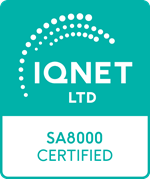
CHE COS'È
Lo standard internazionale SA 8000 è un modello gestionale che si propone di valorizzare e tutelare tutto il personale ricadente nella sfera di controllo e di influenza delle Organizzazioni che lo adottano.E' uno standard che permette di:
- migliorare le condizioni del personale
- promuovere trattamenti etici ed equi del personale
- includere le convenzioni internazionali dei diritti umani

Lo standard SA 8000 è stato pubblicato la prima volta nel 1997 dal Council on Economic Priorities Accreditation Agency (CEPAA), oggi SAI (Social Accountability International); successive revisioni nel 2001, 2008 e l’ultima del 2014 (la cui transizione è terminata il 30 Giugno 2017).
CSQA è membro della federazione indipendente CISQ, unico rappresentante italiano di IQNet, e tramite IQNet (ente accreditato SAAS a fronte dello standard internazionale SA8000) è in grado di offrire questo servizio.
PUNTI CHIAVE
SA8000 è un sistema di gestione (rif. 9001) focalizzato sulle condizioni di lavoro.E' lo standard accreditato riconosciuto a livello internazionale che risponde alle esigenze delle organizzazioni che vogliono distinguersi per il loro impegno nello sviluppo sostenibile e in particolare per le tematiche sociali.
I capitoli sviluppati nello standard sono:
- lavoro infantile
- lavoro obbligato
- salute e sicurezza
- libertà di associazione, diritto alla contrattazione collettiva
- discriminazione
- pratiche disciplinari
- orario di lavoro
- retribuzione
- sistema di gestione
Altri principi:
- coinvolgimento delle parti interessate (stakeholder interni ed esterni)
- tutto il personale è coinvolto, anche il management
- tutti i settori e i siti dell’azienda sono coinvolti
- privilegia la prevenzione piuttosto che il controllo
- finalizzata al miglioramento continuo.Per ottenere la certificazione l'Azienda deve realizzare un Sistema di Gestione della Responsabilità Sociale strumento attraverso il quale l’organizzazione può pianificare, gestire, riesaminare e migliorare le categorie di prestazioni definite all’interno dello standard
VANTAGGI
- Un incremento della credibilità, trasparenza e dell'immagine aziendale sul mercato di riferimento, un beneficio reputazionale
- una maggiore fiducia da parte dei consumatori, miglioramento del rapporto con le istituzioni e le organizzazioni sociali
- un controllo dell'eticità e della correttezza sociale nella catena dei fornitori
- un miglioramento del clima aziendale: i lavoratori si sentono tutelati dall'impresa in cui operano e maggiormente coinvolti nel raggiungimento degli obiettivi
- un miglioramento della comunicazione interna ed esterna, mediante rapporti resi pubblicamente disponibili